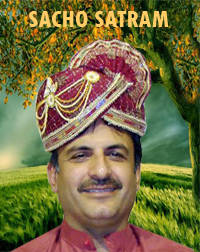In one of his inspiring Satsangs on the sacred occasion of ‘The Auspicious Thursday of Naam Daan,’ Hazir Swaroop Sai Sadhram Saheb shared that the true purpose of Naam is to immerse ourselves in the divine blessings and grace of God, and this becomes possible only through sincere introspection.
Initially, when we sit for Meditation or Nem, our minds are surrounded by a multitude of thoughts.
We must observe our thoughts and become a witness to them.
For example, if we are engaged in a task while also keeping an eye on a child to observe his or her activities, or if we are aware of another person nearby without personally interacting with him or her, we are simply watching without involvement. This is what it means to be a witness to their actions.
In a similar way, when thoughts arise in our minds, we must become witnesses and observers of them. We should recognize that we are not intentionally bringing these thoughts; they are appearing on their own.
Different kinds of thoughts arise on their own in our minds, and we simply witness them without getting involved. As observers, we become aware of which thoughts are positive and which are negative. Through careful observation, we can clearly distinguish between good and bad thoughts.
This awareness helps us understand the nature of our thoughts—whether they are predominantly good or bad, filled with love or tainted with hatred. Our thoughts reveal who we truly are because we are shaped by what we think. Even if our actions may not always reflect our thoughts, the reality is that our true self is defined by what we think.
That is why, when we begin Meditation, we first take on the role of observers.
Most of the time, people stop sitting in meditation because of the variety of thoughts that arise in their minds at the beginning. They struggle to focus and eventually give up, thinking that these thoughts are disturbing them. However, if they allow the thoughts to come and go, and simply observe them without identifying them as their own, those very thoughts will gradually stop troubling them during meditation. But if we focus on the thoughts and emotionally engage with them, failing to observe them without any attachment, they will continue to distract us.
By observing our thoughts, we gain insight into the true nature of who we are and identify the changes we need to make in order to improve our lives.
Improving ourselves means focusing on our inner being and maintaining self-awareness.
If I want to improve and become better, the responsibility lies with me—I must work on myself and strive for growth.
Many masters often express the concern that they do not find sincere students who are truly eager to learn, while students feel that they do not come across enlightened masters or gurus who can uplift them. The root of the problem lies in the lack of sincerity and understanding on both sides.
If a flower is beautiful and fragrant but no bumblebee comes to gather its nectar, its beauty serves little purpose. The bee, by extracting nectar, not only creates honey but also enhances the flower’s value. Similarly, one must have the inner wisdom to extract the nectar of knowledge.
Likewise, if a piece of land is barren, no matter how much rain falls on it, it will not yield anything. For rain to bring nourishment and growth, the land must be fertile. In the same way, a student must be receptive and prepared to absorb the teachings of a true master.
Lakhs of devotees gathered to listen to Shahanshah Satguru Swami Sai Satramdas Saheb’s Satsangs and to have his Darshan.
People from all walks of life—whether virtuous or misguided, self-seeking or sincere—came to him. He not only uplifted the righteous but also illuminated the path of goodness for those who had strayed. Many approached him with personal motives, and once their wishes were fulfilled, they never returned. Yet, only a rare few truly imbibed the wisdom of Shahanshah Satguru, enriched their lives through his company and satsangs, and wholeheartedly followed his teachings.
Thus, only a handful truly embraced the essence of his guidance, transforming their lives through Nem, Dhyan, and Simran. When we sit in Nem, our focus must turn inward, reflecting on how we can elevate ourselves by refining our thoughts and sincerely walking the sacred path laid out by Sai.
We should focus on progressing rather than complaining. Even after expressing gratitude for what we have accomplished, we must continue striving for growth to attain wholeness.
Our desire should not be for him to notice and bless us, but rather to reach a level of sadhna where we become consciously aware of Satguru’s ever-present divine gaze. His blessings and grace are always upon us, yet it is our own awareness that needs to deepen to truly perceive and understand his omnipresence.
Let us purify our vision in such a way that we can merge his gaze into our own. Let us refine our tongue so well that we can hold his words upon it. Let us value his actions so deeply that we make them the way of our life.
Let us keep ourselves as his disciples, always ready to be filled with his grace—not expecting him to fill us with his grace, but striving to make ourselves receptive to it.
If he fills us with his grace, but we are not ready to receive it, then whatever he pours into us will simply overflow and be lost. If we have a pitcher but keep it upside down, nothing can be filled into it, Or if the pitcher is already filled with the filth of ignorance, then too, it cannot be filled with the purity of wisdom.
When we look at the life of Shahanshah Satguru Swami Sai Satramdas Saheb, we see that those who did not make sincere efforts to learn from his teachings remained ignorant and were left behind. In contrast, those who embraced Sai’s divine wisdom with honesty and sincerity progressed and flourished. That is why we must focus on ourselves, continuously striving to be good seekers. Instead of assuming we are already complete, we should embrace the journey of self-improvement and growth.
The true essence of Naam is to refine ourselves by overcoming our shortcomings, growing purer, and becoming better.
If our feet are muddy and there is a water tap nearby, we will naturally go to it to wash and clean them. However, if our feet are already clean, we would avoid stepping into a muddy area and soiling them.
If we recognize a shortcoming within ourselves, we would seek refuge in our Satguru. After receiving his blessings and transforming ourselves, why would we allow ourselves to fall back into the same flaws again?
If we have wealth, we should use it to help those in need or for our own medical treatment if required. We wouldn’t spend it to harm our health or make ourselves unwell.
Money is meant to improve our health, not to harm or deteriorate it.
Money should be used to uphold dignity and honor and for good deeds, not for negativity or wrongdoing.
The same applies to our life—being born healthy, content, and capable of enjoying life does not mean we should engage in wrongdoing, assuming there will be no consequences for our actions.
We have transformed ourselves, and now there should be no turning back or engaging in wrongdoing.When we reflect on Saijan’s life, our focus should not be on how he should have been but on how we should strive to be, because we have come to seek.
We must strive to be like him and keep his teachings alive on our lips. We must embrace his grace in our eyes.
We must protect ourselves with Satguru’s blessings.Only then can we truly transform ourselves. We should not wait for him to bless us but rather prepare ourselves to be worthy of receiving his blessings. His grace is always pouring upon us, but we must learn how to receive it and make the most of it. Naam means to observe our thoughts, just as we observe the people around us. We do not engage in everything they do, but we remain aware, and if they act wrongly, we intervene. Similarly, we must watch our thoughts—when we notice any that are inappropriate, we must shift our mindset and focus on positive ones.
And when we sit in Naam, Dhyan, and Simran with complete devotion and dedication, we will grow, evolve, and transform ourselves for the better.
We should always remember the example of mud and a water tap—when our feet get muddy, we naturally go to the tap to wash them. But once they are clean, we wouldn’t willingly step back into the mud.
God has given us this life for our growth and well-being; we should not engage in anything that leads to sorrow.
We should not accumulate bad karma that brings sorrow into our lives. Instead, we should always strive for good karma, which rewards us with happiness.
We should be mindful of how much we truly benefit from Satguru’s infinite blessings by sincerely following his teachings.
The more we embrace his blessings, the closer we draw to the Almighty, and this is the surest path to our ultimate destiny.



